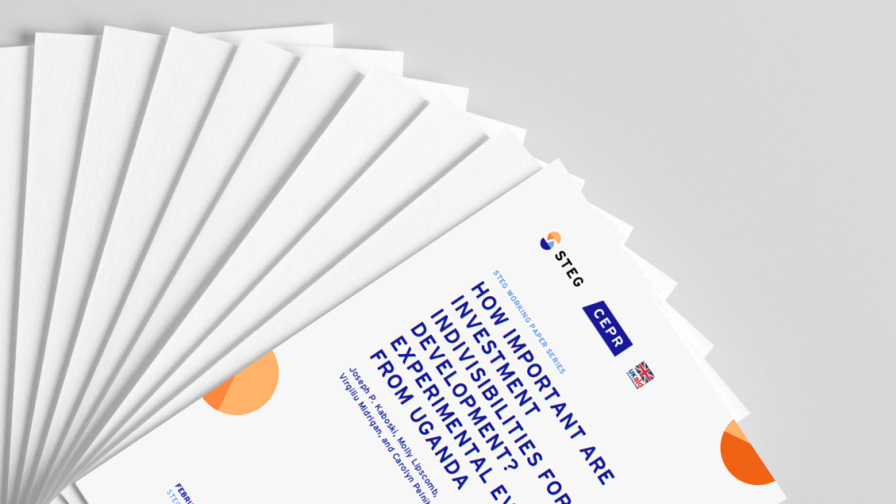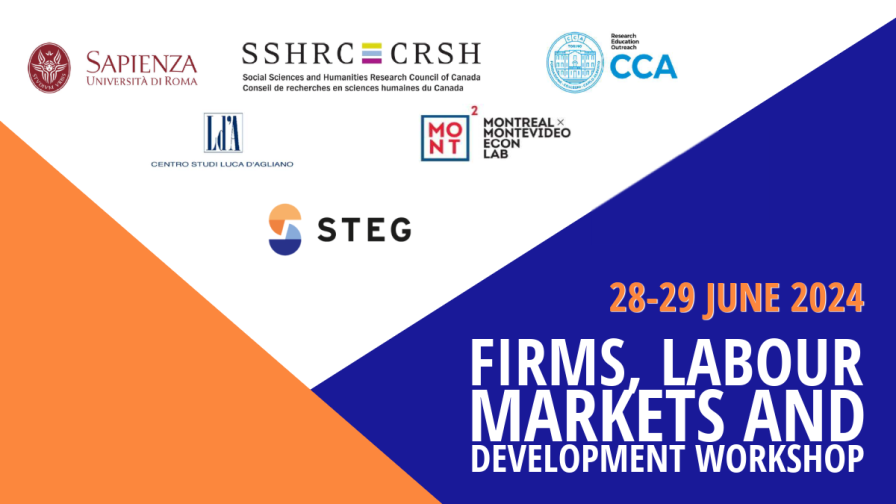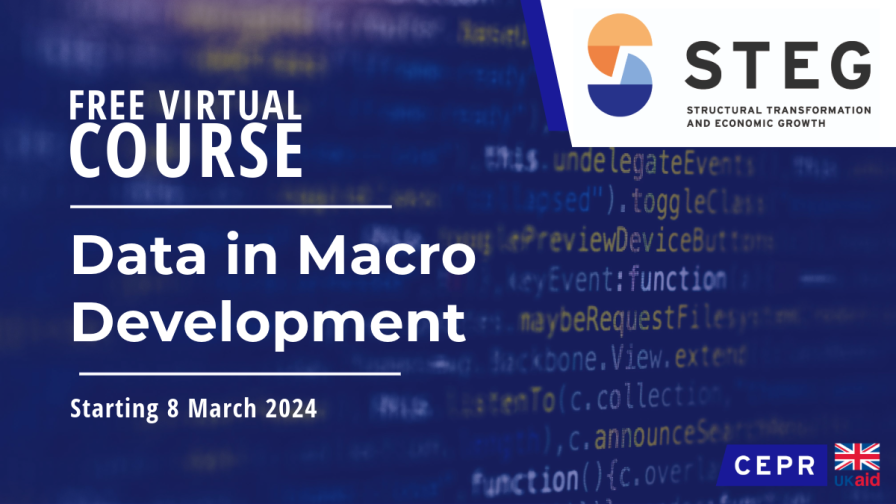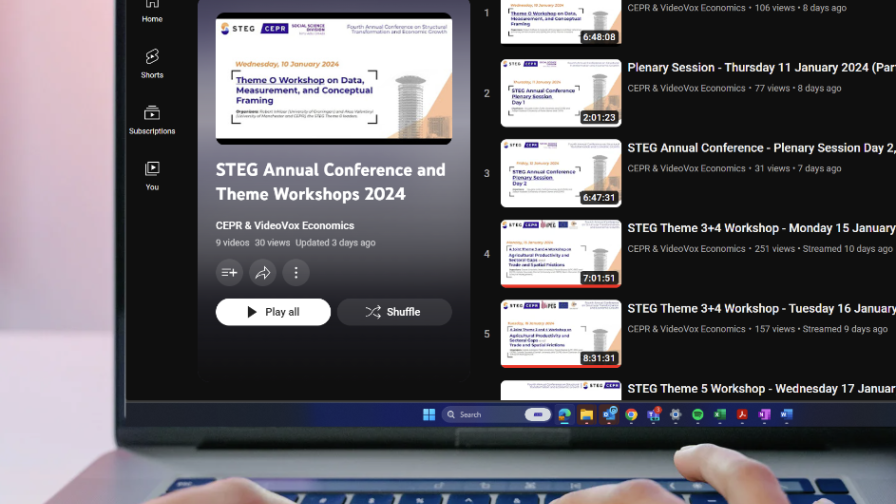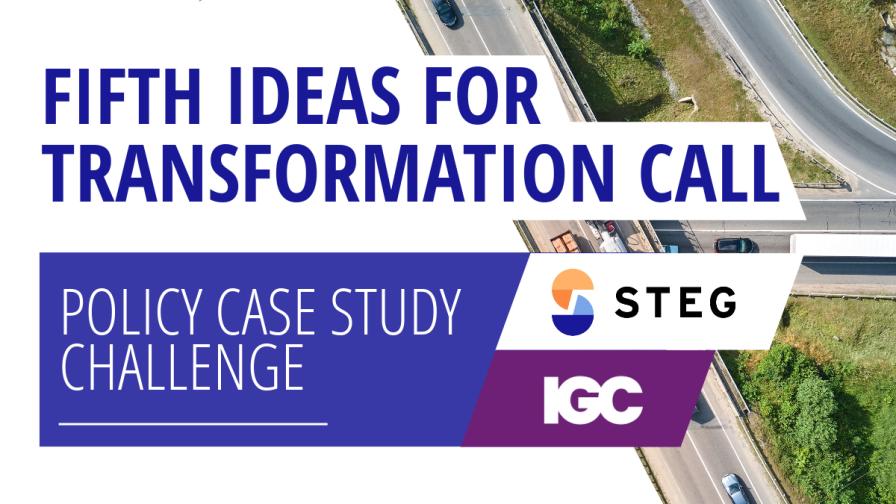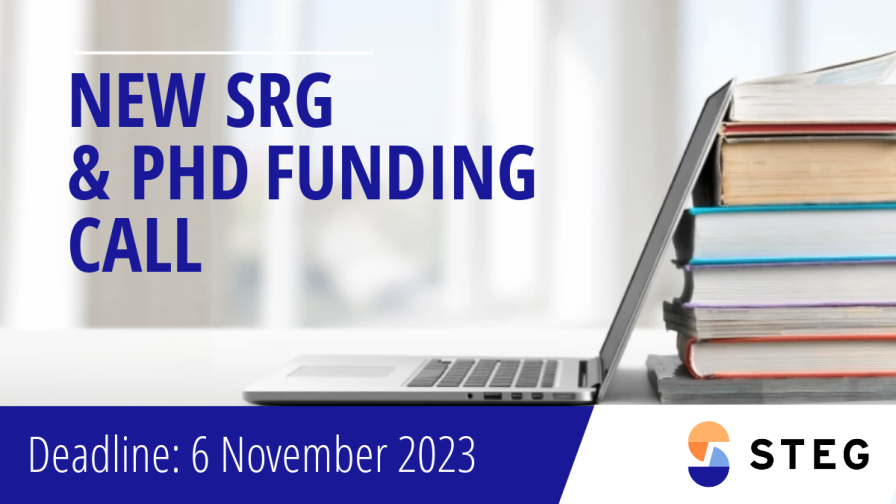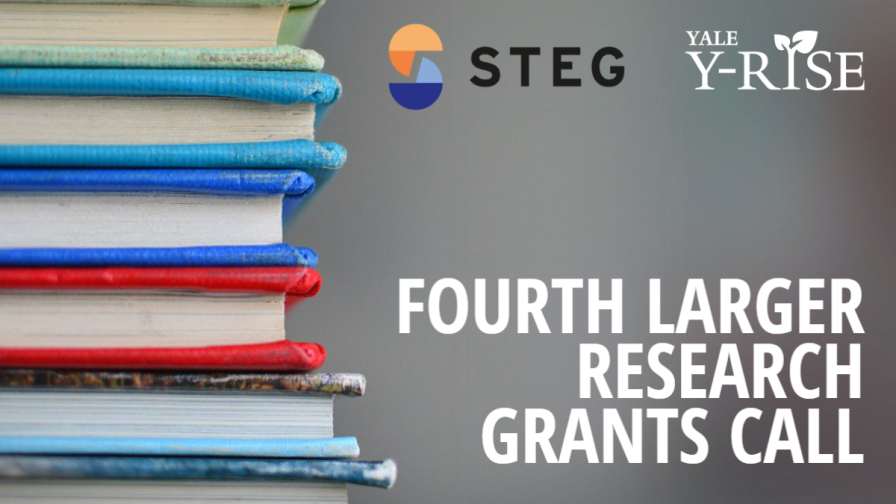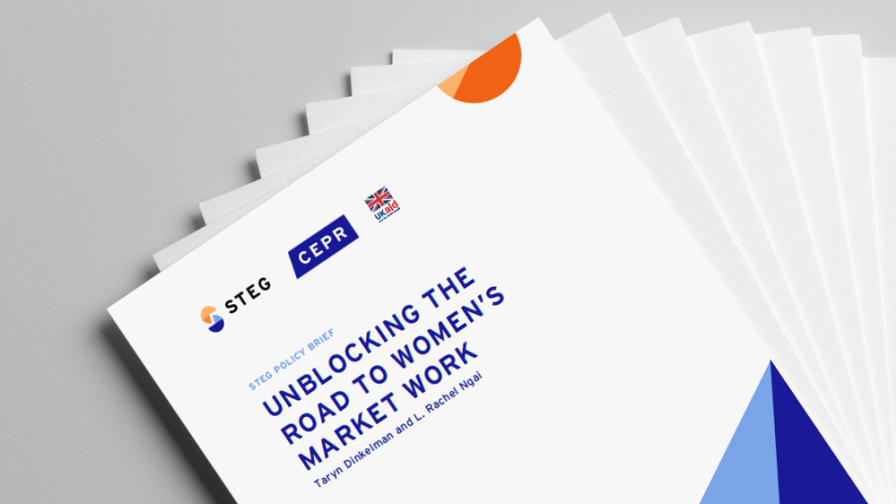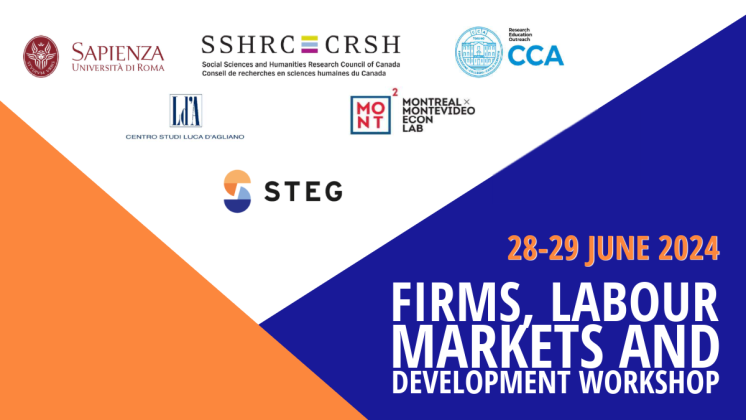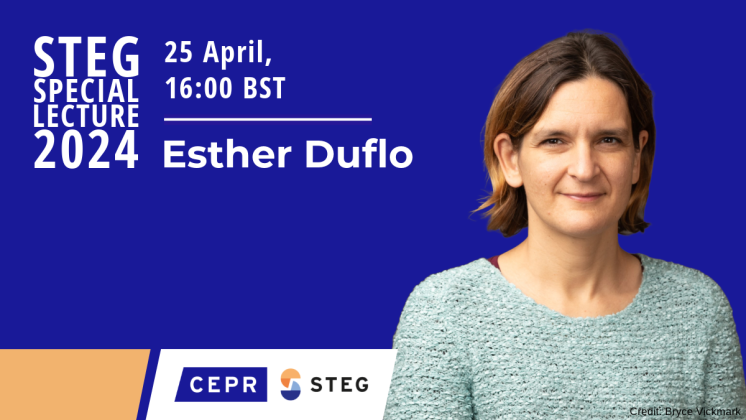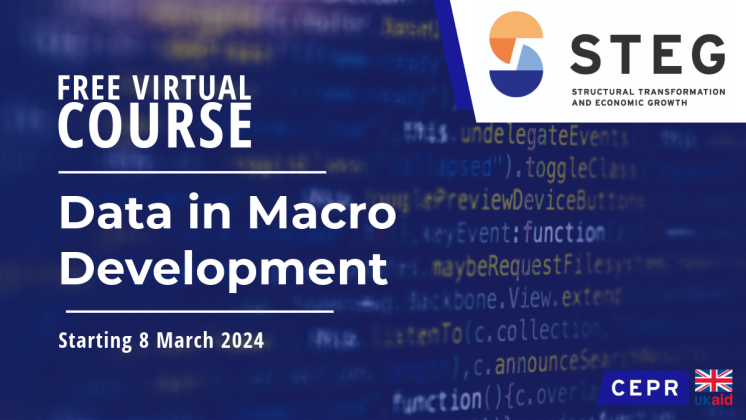Dear All,
STEG has had a busy few months recently with much exciting news to report on!
Our First Small Research Grants Call that closed in June has been fully evaluated with a total of 17 projects selected for funding. This was a particularly competitive round with many high-quality proposals submitted. More details on the successful projects can be found below.
Six Theme Workshops were held in September to highlight research on STEG's six research themes. These cover a wide range of topics on structural transformation where STEG sees a clear demand for further research. Catch up on what you missed out on through the links below.
The dates have been set for our second Annual Conference: 19-21 January 2022. The conference will run virtually and feature keynote talks and presentations on projects and papers related to all aspects of structural transformation.
Our Second Small Research Grants Call, First PhD Research Grants Call and First Ideas for Transformation Call are currently under evaluation with decisions to be returned before the end of the year. The First Larger Research Grants Call will have decisions returned latest in the New Year.
Make sure you also get the all the dates for upcoming calls in your calendar!
Best,
The STEG Team
Funding Decisions on the 1st SRG Call
Final decisions on STEG's First Small Research Grants Call have been made and, after receiving over 100 applications, 17 projects were selected for funding. The level of competition for funding in this initial round was extremely high and we hope that all applicants will still be encouraged to submit to future funding rounds.
Consistent with the priority of the STEG initiative, a number of the successful proposals focus specifically on sub-Saharan African countries, with others taking a cross-country perspective often involving this region. A few proposals draw their case studies from other developing countries but succeeded in making a particularly strong case for the relevance of the research to countries in sub-Saharan Africa.
We were excited by the number of applications submitted on sub-Saharan Africa and encourage researchers to continue to submit proposals focused on this region. A key STEG aim is to develop the available data and research on sub-Saharan countries and we are especially receptive to proposals in this area.
- Andrew Agyei-Holmes, Nana Amma Asante-Poku, and Richmond Atta-Ankomah – Gender Roles, Work and Structural Transformation in a Patriarchal Society: Evidence from a Household Panel Survey on Ghana
- Gregory Casey, Stephie Fried, and Matthew Gibson – The Impact of Climate Change on Human Capital Accumulation: A Macroeconomic Perspective (Nigeria)
- Gaurav Chiplunkar and Sabyasachi Das – Economic Development and Environmental Sustainability under Decentralised Governance (India)
- Tim Dobermann, Faraz Hayat, and Usman Naeem – Heterogeneous Impacts of Market Integration: Evidence from Pakistan’s Motorways
- Kyle Emerick – Agricultural Development and Human Capital in India
- Marco Casari, Marco Fabbri, Hanna Fromell, Robert Lensink, and Daniele Nosenzo – How Formal Property Rights Shape Social and Economic Networks: Evidence from a Land Tenure Reform Implemented as a Randomised Control Trial (Benin)
- Michael Gechter and Namrata Kala – Firm Relocation as Environmental Policy: Impacts on Agglomeration, Workers and the Environment (India)
- Cheryl Doss, Douglas Gollin, Charles Gottlieb, and Markus Poschke – Gender, Work and Structural Transformation (cross-country)
- Minki Kim – Quantifying the Gains from Eradicating Malaria using a Structural Model (cross-country)
- Nathaniel Lane, Reka Juhasz, and Lauri Ojala – Measuring Global Industrial Policy: Patterns and Structure of Industrial Policies Across Developing Economies, 2008-2020 (cross-country)
- Isabela Manelici – The Impact of Multinationals on Informality: Evidence from Mexico
- Kristina Manysheva, Martí Mestieri, and Johanna Schauer – Persistence of Inequality after the Apartheid: Assessing the role of Geography and Skills (South Africa)
- Federico Rossi and Tommaso Porzio – Unpacking Economic Development: Evidence from Cohort- and Region-Level Data (cross-country)
- Laura Alfaro, Marcela Eslava, Martí Mestieri, and Luis Felipe Sáenz – Firm Heterogeneity and Structural Transformation in Developing Countries: Seven Decades of Plant-Level Evidence from Colombia
- Ija Trapeznikova and Juan Pablo Rud – The Interaction of Public and Private Sector Employment in Least Developed Countries (cross-country)
- Breno Sampaio and Gabriel Ulyssea – Informality and the Cost of Children in Developing Countries (cross-country)
- Tillmann von Carnap – Marketplaces as Focal Points of Structural Transformation: Understanding their Emergence, Persistence and Decline Using Historical Maps and Satellite Imagery (Kenya, Tanzania, and Uganda)
Further details on the projects will be available on the STEG website in the coming weeks.
Theme Workshops 2021
If you missed the workshops, you can catch up by watching recordings of each one through the links provided below:
This workshop kicked off the September 2021 STEG Theme Workshop series with a research paper from each theme presented.
Theme 0 Data, measurement and conceptual framing
This workshop focused on how improved data or economic measurement can help shed a light on the process of structural transformation and its link to economic growth.
Theme 1 Firms, frictions and spillovers, and industrial policy
This workshop focused on the roles of firms, frictions, spillovers and industrial policy in structural transformation and economic growth, with a particular interest in understanding the challenges for the poorest countries.
Theme 2 Labour, home production, and structural transformation
This workshop focused on structural change in the labour market in developing countries or in developed countries in historical perspective, links between home and market work, and trends in female labour force participation over the development process.
Theme 3 Agricultural productivity and sectoral gaps and Theme 4 Trade and spatial frictions
This joint workshop between Themes 3 & 4 focused on how market integration – both internal and global – shapes the structural transformation process in developing countries.
Theme 5 Political distortions and structural transformation
This workshop focused on the political economy of policies that promote economic development examining why growth-conducive policies are adopted in some regions but not others, the role of capture by interest groups, and the implications of increased collaboration between the public and private sectors?
STEG Annual Conference 2022
Save the date for our second Annual Conference from Wednesday 19 to Friday 21 January 2022. To ensure that everyone can attend, this will be a virtual event as with the STEG Annual Conference 2021.
The conference will feature keynote talks from distinguished academics in the field, presentations from ongoing projects, including those funded by STEG in our recent call rounds, and presentations of some of the most recent research papers related to structural transformation. Through the conference, we hope to highlight the diversity of research in the field and offer more opportunities for early-career researchers and scholars representing a wide range of institutions and geographies.
Further details on the conference structure and how to apply to present your project or paper will be available on the STEG website in the coming weeks.
Important Dates
Calls under Evaluation
First Ideas For Transformation Call - decisions expected by mid-November
Second Small Research Grants Call - decisions expected by mid-December
First PhD Research Grants Call - decisions expected by mid-December
First Large Research Grants Call - decisions expected by mid-January
Open Calls
There are currently no funding calls accepting applications.
Opening Soon
Third Small Research Grants Call - opens 1 November
Second PhD Research Grants Call - opens 1 November
Second Ideas For Transformation Call - opens 1 November
Find a provisional call timeline for calls further in the future here.
Upcoming Events
Annual Conference 2022 - 19-21 January 2022

